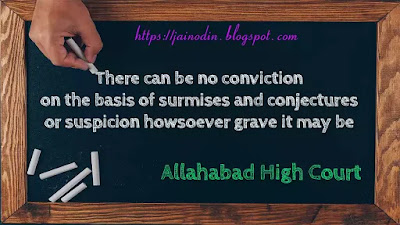There can be no conviction on the basis of surmises and conjectures or suspicion howsoever grave it may be. Strong suspicion, strong coincidences and grave doubt cannot take the place of legal proof.
In para 14 of its judgment Hon'ble Supreme court in case of Digamber Vaishnav and another vs State of Chandigarh (2019) 4 SCC 522, has held as under:
"14. One of the fundamental principles of criminal jurisprudence is undeniably that the burden of proof squarely rests on the prosecution and that the general burden never shifts. There can be no conviction on the basis of surmises and conjectures or suspicion howsoever grave it may be. Strong suspicion, strong coincidences and grave doubt cannot take the place of legal proof. The onus of prosecution can't be discharged by referring to very strong suspicion and existence of highly suspicious factors to inculpate the accused nor falsity of defence could take the place of proof which the prosecution has to establish in order to succeed, though a false plea by the defence at best, be considered as an addition circumstance if other circumstances unfailingly point to the guilt."
Thus , from the law laid down in the above referred cases, it is well settled, that in criminal case the general burden of proof unless there is a specific statute to the contrary, squarely rests on the prosecution to prove its case against accused beyond reasonable doubt which never shifts and special burden to prove the circumstances coming under exception rests upon the accused. In proving the case beyond reasonable doubt, prosecution can not take advantage of falsely instituted case or false plea taken by the defence or infirmity in defence. Suspicion, however strong can not take the place of legal proof.[Para no.26 & 27]
Allahabad High Court
Gauri Shanker @ Bacchan Yadava
Vs.
State Of U.P.
Decided on 29/05/2020

